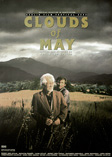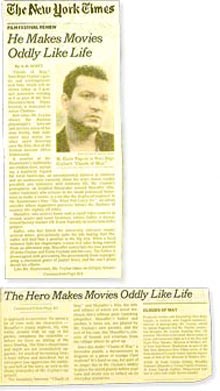|
|
The New York Times HE MAKES
MOVIES ODDLY LIKE LIFE "Clouds of May", Nuri Bilge Ceylan's gentle and contemplative new film, which will be shown today at 3 p.m. and tomorrow evening at 6 as part of the New Directors/New Films festival, is dedicated to Anton Chekhov. And while Mr. Ceylan shares the Russian playwright's tolerant and incisive sense of human frailty, film audiences may notice another spirit hovering over the film, that of the Iranian director Abbas Kiarostami. A number of Mr. Kiarostami's hallmarks are evident here, including a painterly regard for rural landscape, an unsentimental interest in children and an unobtrustive curiosity about the ways movie reality parallels and intersects with ordinary life. Mr. Ceylan's protagonist, an Istanbul filmmaker named Muzaffer (Muzaffer Ozdemir) who returns to his small provincial hometown to make a movie, is a bit like the displaced engineer in Mr. Kiarostami's film "The Wind Will Carry Us" : an urban outsider whose inquisitive presence throws the rhythms of coutry life slightly off kilter. Muzaffer who arrives home with a small video camera to recruit actors and scout locations, enlists Saffet, a discontented factory worker (M. Emin Toprak), to assist him in his project. Like Mr. Kiarostami, Mr. Ceylan takes an oblique, leisurely approach to narrative. We spend a lot of time with the characters Muzaffer's young nephew, Ali, who walks around with an egg in his pocket, completes the ensemble- before we have an inkling of the story binding. The film's shapeliness and depth are not immediately apparent; for much of its running time, it feels diffuse and anecdotal, but in resrospect you appreciate the subtlety and heft of the story, as well as the tricky profundity of Mr. Ceylan's approach. The boundary between "Clouds of May" and Muzaffer's film, the title and subject of which are never disclosed, blurs without quite vanishing altogether. Muzaffer's father and mother, it turns out, are played by Mr. Ceylan's own parents, and the rest of his cast of Muzaffer's consists of friends and relations from the willage where he grew up. Does this make "Clouds of May" a formalist puzzle, a documentary in disguise or a piece of trompe l'oeil realism? It's hard to say, but part of its magic lies in Mr. Ceylan's ability to place the world plainly before your eyes and invite you to reflect on its everyday mysteries.
|


